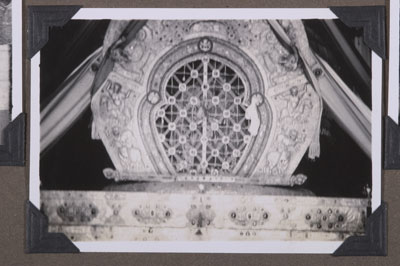
2001.35.396.25.6 (Album Print black & white)


2001.35.396.25.6 (Album Print black & white)

Evan Yorke Nepean
Evan Yorke Nepean
November 22nd 1936
Lhasa > Potala > Tomb of 13th Dalai Lama
2001.35.396.25.6
90 x 58 mm
Negative
Loaned August 2002
Judy Goldthorp
British Diplomatic Mission to Lhasa 1936-37
Lady Nepean
2001.35.124.1
Notes on print/mount - 'Detail of the Tomb'. [MS 30/07/2006]
Other Information - Dates: This photograph was probably taken on November 22nd 1936, the second occasion on which the Mission staff led by Sir Basil Gould visited the Potala. The first occasion was September 6th 1936. However, this was the day on which Nepean arrived in Lhasa from Gyantse with the wireless set that he had stayed behind to fix. It seems unlikely, therefore, that this photograph was taken in September as Nepean was probably still en route into Lhasa at the time of the official visit [MS 30/07/2006]
Other Information - Description: Chapman wrote a relatively extensive description of this tomb and the structural alterations that its construction had necessitated upon the Potala itself in his book Lhasa the Holy City [London: Chatto & Windus, 1938; reprinted London: Readers Union Ltd., 1940]. Chapman wrote: "The main chorten is encased in gold embossed with different designs and plentifully encrusted with precious stones. In some places valuable charm boxes, turquoise ear-rings, onyx and coral snuff-boxes, strings of amber and pearls, and innumerable unset gems have been let in to form designs on the gold background. On several shelves in front are displayed more precious presents, gifts from the ancient and noble families of Tibet and from the rich monasteries of China and Mongolia. Here are rare porcelain vases, exquisite examples of cloisonne work, chalice-like vessels of solid gold, meticulously wrought metal-work, alabaster models of temples, and glass cases containing curiously fashioned flowers with leaves and petals of china. On the eastern wall of the room are pigeon-holes containing holy books with carved wooden covers, many small images, and filigree charm-boxes such as are carried by travellers. // In front of the shrine burn several enormous butter-lamps of solid silver. They stand four feet high, and the bowls, with a tow of burning wicks floating in the fat, are more than two feet in diameter. Each wick has melted a little lake for itself in the congealed butter. White scarves had been thrown up on to the chorten by pilgrims, and there were vases of artificial and real flowers in different parts of the shrine, while the square wooden pillars surrounding the tomb and supporting the roof are covered by long brocade strips of different colours, each hanging over the next like the scales of a fish. Although certain details of the tomb, such as the crystal globes hanging from the ceiling and a coloured biscuit-tin on one of the shelves, struck a false note, the general impression is a fitting tribute to the memory of this revered ruler" [1940, pp. 179-80] [MS 11/4/2005]
For Citation use:
The Tibet Album.
"Tomb of 13th Dalai Lama, Potala"
05 Dec. 2006. The Pitt Rivers Museum.
<http://tibet.prm.ox.ac.uk/photo_2001.35.396.25.6.html>.
For more information about photographic usage or to order prints, please visit the The Pitt Rivers Museum.
© The Pitt Rivers Museum